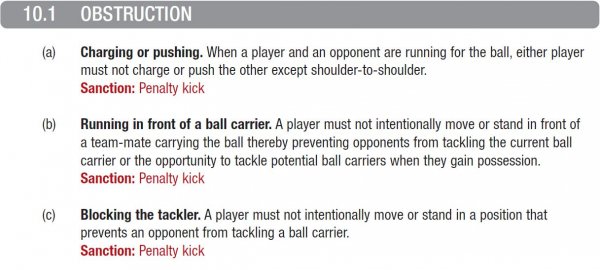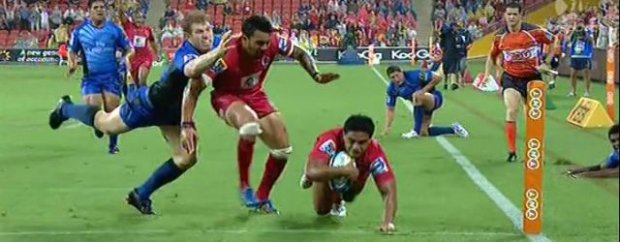Over the weekend there were quite a few tries scored. Two each for the Reds and the Force, a four try bonus point for the Waratahs and the Rebels got to score their first ever try against the Waratahs, scored by the wiley old character Penalty. The one that has caused the most discussion in the forum has been the first try during the Reds v Force game on Saturday night.
Ben Tapuai scored the first try of the night team work that started with a Reds scrum 15m out from their line, a Mike Harris clearance kick was taken by Nick Cummins and he started the kick return from 10m inside Force territory. The Reds kick-chase line came up strong and in the tackle Beau Robinson pilfered the ball. Harris picked it up and took it to the line where he passed to Albert Anae, he took it to the line and took the tackle. Jake Shatz and Harris secured fast ball which was picked up by Will Genia. Genia sniped and as he was tackled by Brett Sheehan, he offloaded in front of the tackle to Ben Tapuai, who showed incredible handling to take the ball behind him and reel it in. With open space before him he took off for the line with Digby Ioane in support. Tapuai pushed off Force Hooker Nathan Charles and Napolioni Nalaga before diving over the line with Ioane still in support and David Pocock close behind.
The try was awarded but the discussion came from the fact that Pocock was unable to tackle Tapuai because Ioane was in between the two of them. Some people, the referee included, thought there was nothing illegal going on. These people said that Ioane was quite within his right to be there as he was simply running a (good) support line. Some considered that Ioane had infringed Pocock’s ability to make the tackle and therefore it was no try and a Force penalty.
The discussion started in the Shoutbox and was continued in the forum by this comment from Tiger:
There was some chatter in shoutbox about whether Digby obstructed Pocock in getting to Taps. I thought it was fine at the time because he was trailer the ball carrier in a position to take the pass so thought it was pretty hard to say he intended to obstruct. Any had any further thoughts on it?
The first reply was from Seahorse, and it said:
My thoughts at the very beginning was that he was indeed obstructed from making a tackle. The fact that Pocock ran into Digby who was just about right next to Taps tells me Pocock was within range to make a tackle & was denied the opportunity. But for whatever reason the officials decided to let it slide. I find it strange but thats just me & I’m not out there with the whistle myself.
So I put this video together to get it clear in my mind who and where the players were:
[youtube]http://www.youtube.com/watch?v=efNOh8mGZoQ[/youtube]
The questions seem to focus on the role of Ioane and determining if his positioning interferes with Pocock’s ability to defend the line. Looking at the relevant parts of the laws we can see the following:

10.1(a) The ball wasn’t being chased so that doesn’t apply;
10.1(b) Ioane is not in front so doesn’t apply;
10.1(c) says Digby cannot move or stand intentionally in a position that prevents Pocock making the tackle
This is the most relevant of the laws to this case, for this to be a Penalty Offence, you would have to argue that Ioane was intentionally running in support to block Pocock, given no where in the footage can you see Ioane check to see where Pocock was, nor any unusual acceleration/deceleration or swerves you would have to say he clearly wasn’t.
In fact you could argue the only infringement in the whole play comes from Pocock himself. When Pocock, seemingly because there is nothing else he can do, tackles Ioane he could be charged with breaking law 10.4(f), which says;

When Pocock tackled Ioane he should have been penalised under this law, but in this case, despite the infringement, Tapuai is still able to successfully ground the ball so obviously advantage applies and no penalty is required.
The officials got it right, it was a fair try.
Let’s not stop there though, let’s go Mythbusters style and push it as far as we can to see what might happen. Matty_K posted this comment:
Since Digby is allowed to hold his line and since Pocock can’t obviously phase through Digby is Pocock allowed to bundle them both out of the field of play or tackle Digby into Taps to disrupt the try.
If Pocock’s tackle on Ioane had of caused them to collide with Tapuai and he was to go into touch or lose the ball which prevented the try from being scored, the laws would have given the referee the right to award a penalty try as Law 10.2(a) says:

There is an argument that though the Law refers to if a try would probably have been scored, it is actually more customary for referees to award penalty tries only if a try would definitely have been scored so that is the actual interpretation that would apply. Given the sequence and distances involved, I think it was definite that Tapuai would have scored anyway so same result.
That being the case, should Pocock have been given a yellow card if his tackle caused a penalty try? We saw in the Waratahs v Rebels penalty try that Tatafu Polota-Nau was yellow carded after the penalty try was awarded. This is because, as the law states, the player who prevented the try being scored MUST be cautioned and temporarily suspended (Yellow Card) or sent off (Red Card).
This however is not the whole story, in 2004 the IRFU applied to the IRB to have a ruling made on this law, and the following clarification was issued:
Ruling in Law by the Designated Members of the Rugby Committee
Ruling: 9-2004
Union: IRFU
Law Reference: 10, 22
Date: 23 December ’04
Request
The IRFU has requested a ruling with regard Law 10-Foul Play and Law 22-In Goal.
Rewrite and amendment of 10.2(a), and consequential addition to Law 22.
The first paragraph states:
Intentionally Offending. A player must not intentionally infringe any Law of the Game, or play unfairly. The player who intentionally offends must be either admonished, or cautioned that a send off will result if the offence or a similar offence is committed, or sent-off. After a caution a player is temporarily suspended from the match for a period of ten minutes playing time. After a caution, if the player commits the same or similar offence, the player must be sent-off. Penalty: Penalty Kick
The final paragraph states:
A penalty try must be awarded if the offence prevents a try that would probably otherwise have been scored. A player who prevents a try being scored through foul play must either be cautioned and temporarily suspended or sent off.
The final paragraph does not appear to offer the possibility of an ‘admonishment’ by the referee; nor does it refer to ‘intentionally’.
The clarification sought is:
Is it the intention of the Law (as now rewritten) to ensure that in each and every circumstance, where a penalty try is awarded, that the offending player is temporarily suspended, whether or not the foul is intentional?
Is it the intention to remove the discretion of the referee to admonish, rather then temporarily suspend or send off a player in such circumstances?
The reason clarification is sought is that there are circumstances where the offence is not intentional: e.g. mistimed (early or late, but not dangerous) tackle; unintentional instinctive high, but not dangerous, tackle -when an attacker steps inside a defender; certain incidences of scrum collapsing.
In these circumstances, the sanction of a penalty try, and a temporary suspension appear exceptionally severe. While it will not be a frequent occurrence, the effect on a match outcome could be hugely significant. It could also, in the event of a front row forward, lead to uncontested scrums.
Finally, it would appear inconsistent for an offence which, taking place in mid-field, would not merit a temporary suspension but would merit a temporary suspension close to a goal-line.
Ruling of the Designated Members of the Rugby Committee
Law 10.2(a) is Unfair Play relating to Intentional Offending.
The two paragraphs in Law 10.2(a) must be read in conjunction, having due regard to the heading ‘Intentionally Offending’.
Therefore, if a penalty try is awarded as the result of a player intentionally offending, then the player must be either be cautioned and temporarily suspended or sent off.
Examples of this would be after penalty tries resulting from:
- a collapsed scrum
- a collapsed maul
- a defending player intentionally offside
- a defending player intentionally knocking down the ball.
If a penalty try is awarded as the result of a player unintentionally offending, the player, as well as being liable to cautioning and temporary suspension or send off, can be admonished by the referee.
Examples of this may be after penalty tries resulting from:
- mistimed tackle (early or late, but not dangerous)
- unintentional reactionary high tackle, but not dangerous.
As we can see from the clarification issued, a Yellow or Red card is still to be issued on the awarding of a Penalty Try, however if the Penalty Try is caused by a player UNINTENTIONALLY offending, the referee has a third option available, and that is to admonish the player who offended. The referee in the Waratahs v Rebels match obviously deemed that Polota-Nau INTENTIONALLY brought down the maul and therefore once he’d made the decision to award a penalty try he had to follow the ruling below and issue a yellow card. Pocock’s tackle, in my opinion, would probably be deemed a mistimed tackle and therefore not intentional and therefore no requirement for the referee to give a yellow card and a penalty try.
But then, is there really such a thing as an unintentional tackle?

